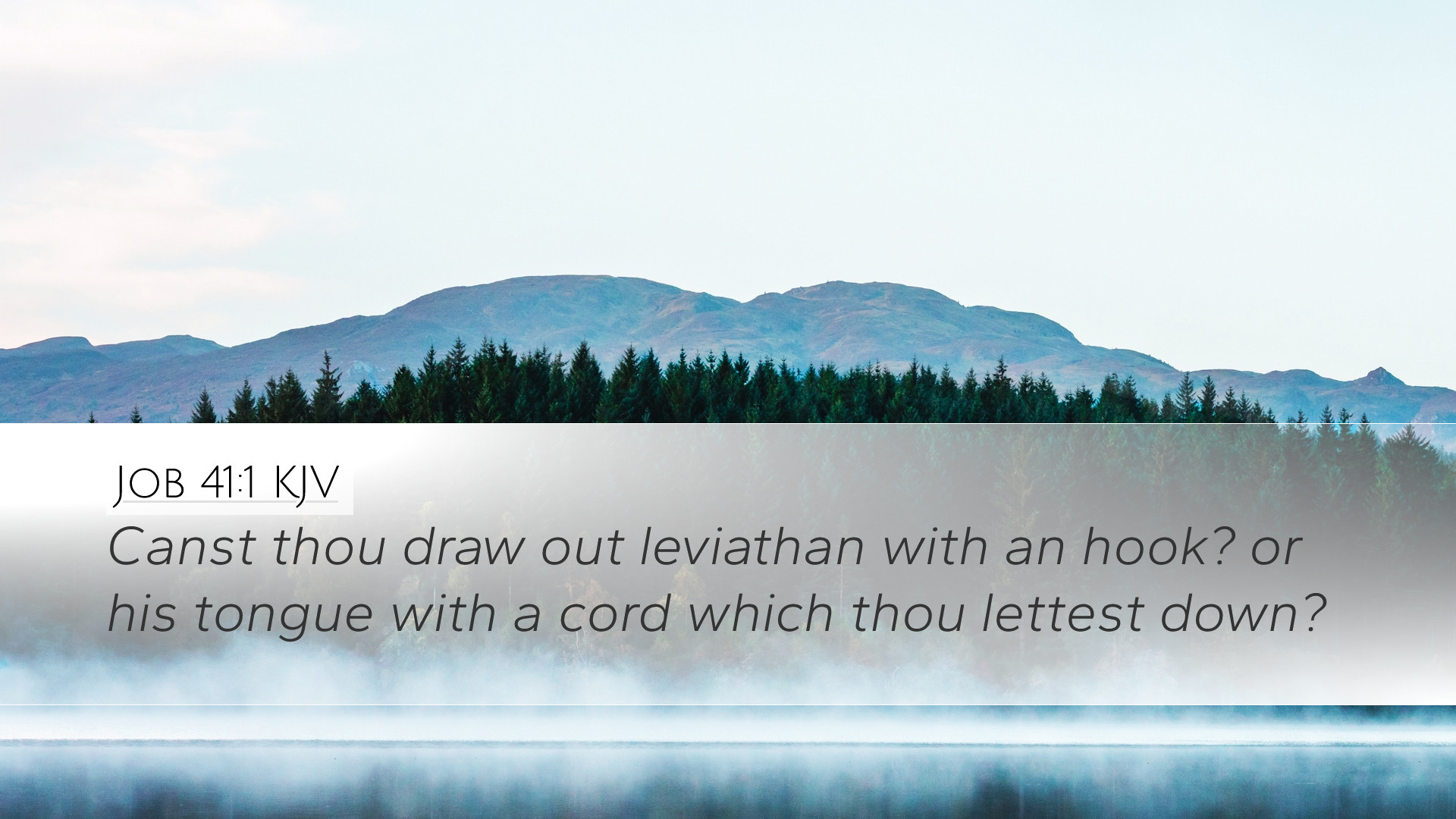Commentary on Job 41:1
Verse: “Canst thou draw out leviathan with a hook? or his tongue with a cord which thou lettest down?”
Introduction
The book of Job raises profound questions about suffering, divine justice, and human understanding in the face of God’s sovereignty. Job 41 enters a critical phase where God, in His response to Job, emphasizes His power and the futility of human attempts to control the uncontrollable. This verse introduces the majestic creature known as Leviathan, symbolizing chaos and divine power.
Exegesis of the Text
The term “Leviathan” is often interpreted as a representation of a powerful sea creature, perhaps akin to a crocodile or a mythical dragon. This imagery conveys not just the might of nature but also the impotence of humanity against such forces.
Questions Posed by God
God’s questions to Job serve as a rhetorical device, reminding Job of the limitations of human capability. God asks, “Canst thou draw out leviathan with a hook?” This inquiry highlights the impossibility of subduing something as formidable as Leviathan. It serves as a metaphor for God’s dominion over creation, showcasing His sovereignty and might.
Interpretation According to Matthew Henry
Matthew Henry elaborates on the idea that God uses these questions to exhibit His own power, contrasting it with human weakness. He notes that the leviathan's strength is an image of the fierce and untamable aspects of creation that only God can control. Henry emphasizes that man's arrogance must be humbled in light of such grand representations of divine authority.
Insights from Albert Barnes
Albert Barnes presents Leviathan as a creature that stands as a symbol of God’s creative power and eternal sovereignty. He remarks on the futility of man’s attempts to harness such creatures, drawing parallels to the spiritual context where human limitations starkly contrast with divine omnipotence. Barnes underscores that God’s inquiry reveals the truth about human dependency and the necessity of humility.
Analysis by Adam Clarke
Adam Clarke provides a more detailed description of Leviathan, suggesting its association with a fierce marine creature that was likely known to the people of ancient times. Clarke emphasizes that the leviathan symbolizes chaos and disorder, elements that are often understood as contrary to God’s created order. His commentary stresses how human effort stands powerless against such chaos, reflecting the broader theme of divine order versus human disorder.
Theological Implications
- Divine Sovereignty: The portrayal of Leviathan signifies God’s absolute authority. It prompts believers to recognize their place within God’s creation.
- Human Limitation: The verse reminds us that there are forces beyond human control, emphasizing the need for reliance on God’s power.
- Suffering and Chaos: Throughout the book of Job, suffering is a significant theme, and God's references to Leviathan underscore that chaos in life is under His sovereign control.
- Humility Before God: Job’s recognition of his limitations in the face of such questions leads to humility, which is a crucial posture for understanding our relationship with the divine.
Application for Contemporary Readers
For pastors, theologians, and students of the Scriptures, Job 41:1 offers significant truths pertinent to today’s context. The challenges of life can often feel overwhelming and chaotic. This verse serves as a poignant reminder of God’s overarching authority in the face of human struggles.
Pastoral Insights
Pastors can draw from this text to encourage congregations facing adversity, inviting them to trust in God’s sovereignty over seemingly uncontrollable forces in their lives. Emphasizing God’s power over chaos can lead to a deeper understanding of divine providence in times of pain.
For Theologians and Scholars
Theologically, this verse acts as a commentary on the nature of evil and suffering. It invites scholarly discussion about the interplay between divine sovereignty and human free will, encouraging comprehensive engagement with the text’s implications in both ancient and modern contexts.
For Students of Scripture
Students studying this verse will benefit from exploring historical interpretations and the cultural significance of Leviathan within the Hebrew text. Analyzing various commentaries broadens understanding and fosters a deeper appreciation of theological themes within the book of Job.
Conclusion
Job 41:1 serves as a profound reflection on the nature of God’s control over creation and the limitations of human agency. Through the imagery of Leviathan, believers are reminded of their dependence on God's sovereign will and the call to humility in understanding life’s complexities.


